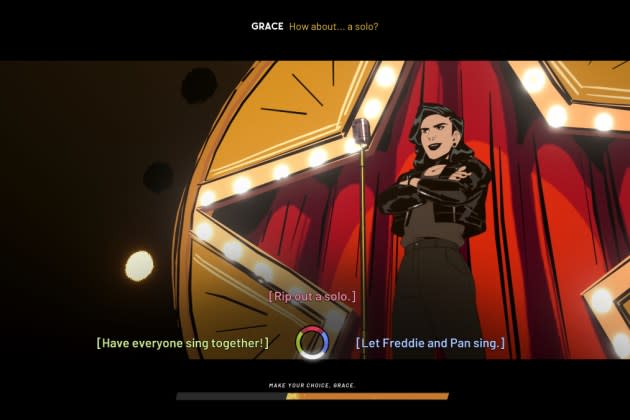How the Creators of Stray Gods Made a Musical That’s a Video Game
- Oops!Something went wrong.Please try again later.
- Oops!Something went wrong.Please try again later.
- Oops!Something went wrong.Please try again later.
- Oops!Something went wrong.Please try again later.

Stephen Sondheim, Leonard Bernstein, the musical “If/Then”: These aren’t the usual conversational touchpoints in a discussion about a video game. But all three of those musical theater references, and many more, were brought up by the creators of the new video game Stray Gods on the latest episode of “Stagecraft,” Variety’s theater podcast.
Listen to this week’s “Stagecraft” podcast below:
More from Variety
Why Theater Is (Not) Doomed, According to Three Leaders in the Trenches
'The Cottage' on Broadway Is Just the Beginning of Jason Alexander's Busy Theater Schedule
How Theater Kids Improvised Their Way to a Sundance Success With 'Theater Camp'
Billing itself as a “Roleplaying Musical,” Stray Gods mashes up musicals and gaming to tell an urban-fantasy story that allows players not only to influence how the narrative goes but also lets them choose, in the middle of a tune, how that song will develop lyrically, musically and emotionally. It all adds up to something that the game’s composer Austin Wintory (Journey, Abzu, Assassin’s Creed Syndicate) described as “a video game musical where the music is interactive and branching and a real, core part of the gameplay.”
Both Wintory and writer David Gaider (Dragon Age: Inquisition, Star Wars: Knights of the Old Republic, Baldur’s Gate 2), the BioWare alum who is the creative director and co-founder of Summerfall Studios, cited the musical episode of “Buffy the Vampire Slayer” as an inspiration for the game.
“I remember thinking: Oh, the music is such a great short cut to the soul,” Gaider recalled. “Can we put that in a game?”
The creative team of Stray Gods leaned on Broadway regulars like Anthony Rapp and Merle Dandridge to fill out several of the roles in the game’s voice cast. One Broadway alum, Anjali Bhimani (“Ms. Marvel”), appeared on “Stagecraft” with Gaider and Wintory and noted that the unusual process of working on Stray Gods reminded her of devising new stage shows like “Metamorphoses” with the director Mary Zimmerman.
“It was very reminiscent of the rehearsal process when you’re putting [something like ‘Metamorphoses’] together,” she said. “You’re trying to figure out: Okay, we know we are telling this epic story but we’re not entirely sure which way we want to tell this epic story. What parts of this character do we want to show? What parts of the story?”
For Stray Gods, Bhimani acted out all the different facets and emotions of her character, based on all the choices a player could make. It recalled those experimental rehearsals with Zimmerman, she said: “It really hearkened back to my early days of doing theater in Chicago, which sparked my heart.”
On “Stagecraft,” Bhimani, Gaider and Wintory described the complicated process of writing and planning a branching narrative that allows for player choice — and how much more complex the endeavor becomes when music get involved.
“You end up with a song that’s 900 bars longs or 1500 bars long,” Wintory explained. “The shortest ones had 20 minutes worth of material and the longest ones were more like 45 minutes, even though the player will only experience four or maybe five minutes of each song.”
Gaider said he knew he had to honor at least some of the rules of musical theater, like making sure the main character’s first song was a heartfelt “I want” number. But he also knew that “most of those rules were going to go flying out the window as soon as you introduced the interactive element.”
For Bhimani, Stray Gods offered a rare collision of two genres that don’t often overlap — but fans of both are out there, like Lea Salonga and Bhimani herself: “There was a long period of time when the three things that defined what season it was in my life were: what show am I doing, what snacks am I eating and what games am I playing… Broadway was my ‘Heroes of Might and Magic’ phase.”
To hear the entire conversation, listen at the link above or download and subscribe to “Stagecraft” on podcast platforms including Apple Podcasts, Spotify and the Broadway Podcast Network. New episodes of “Stagecraft” are released every other week.
Best of Variety
Sign up for Variety’s Newsletter. For the latest news, follow us on Facebook, Twitter, and Instagram.
